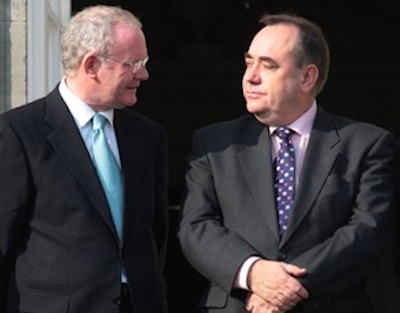
Sinn Fein’s Martin McGuinness has repeated a call for a vote within the north of Ireland following the Scottish independence referendum.
The Six County Deputy First Minister said things would never be the same again for Scotland or elsewhere following the vote. He said the debate on Scottish independence showed that it is possible to discuss constitutional issues “in a spirit of respect for all sides”.
“I believe we could do that without opening up divisions which would be detrimental to the institutions,” he said.
According to the 1998 Good Friday agreement, British Direct Ruler Theresa Villiers can call a ‘border poll’ at any time. It also specifies that the cabinet minister should order such a Six-County referendum if it appears likely that a majority of those voting would seek to form part of a united Ireland.
While many nationalists and republicans have sought a national (island-wide) referendum on Irish unity, a ‘border poll’ vote would be restricted to those living under British jurisdiction, where there is a built-in unionist majority. Nevertheless, it is still firmly opposed by unionists.
Mr McGuinness said the rejection of Scottish independence in Thursday’s referendum had come in the face of a “fear campaign”, and that the result marks only the beginning of a debate on the future for Scotland, England, Wales and Ireland.
He said it was clear that British Prime Minister David Cameron was aware that enormous change is now needed adding: “If Scotland are now going to look into constitutional change and more devolved powers then we here have to be very much in that mix as well.
“I think it is important now that we speak to our colleagues not only in Scotland but also in Wales. The only way forward now is with a united voice which has at its heart the best interests of all our people.”
In short, he said: “This does not signal the end of the debate - but rather the beginning of a wider discussion.”
Last week, Democratic Unionist First Minister Peter Robinson demanded a new agreement to replace the St Andrews peace deal negotiated in 2006, demanding a replacement of a ‘dysfunctional’ Belfast Assembly. Events in Scotland have dramatically accelerated the sense of urgency to revamp the moribund political institutions of the peace process.
Sinn Fein says it has accepted that the process is in serious trouble and has urged a new talks effort with the genuine involvement of the Dublin and London governments, as well as the US administration.
In terms of the problems facing the Stormont assembly, Mr McGuinness said the finger of blame had to be pointed squarely at David Cameron and the Conservative government in London.
He said there was agreement with DUP leader and Six-County First Minister Peter Robinson on the need to tackle the budget crisis facing the Belfast Assembly.
But he said there was a “rump” of DUP hardliners -- “between nine and twelve powerful individuals” -- who were blocking progress on issues relating to the past, flags and parades.
Robinson later rejected McGuinness’s suggestion of a referendum, which he said is “not necessary”.
“More and more people in Northern Ireland want to maintain the status quo,” he said.
![[Irish Republican News]](https://republican-news.org/graphics/title_gifs/rn.gif)
![[Irish Republican News]](https://republican-news.org/graphics/title_gifs/harp.gif)

